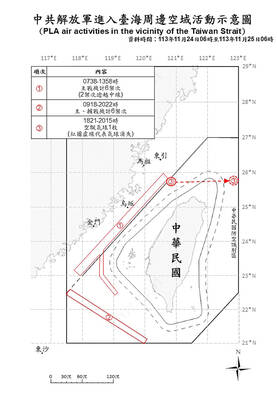The Mainland Affairs Council (MAC) is to collect more information to determine the implications of Beijing’s latest omission of the modifier “peaceful” in its plans for unification, MAC Minister Chiu Tai-san (邱太三) said yesterday.
Chinese Premier Li Qiang (李強) on Tuesday delivered a work report at the opening of the Chinese National People’s Congress that dropped the descriptor “peaceful” from the report’s call for “reunification,” adding instead that it would “be firm” in doing so.
Chiu told legislators at an Internal Administration Committee meeting that the government analyzes all reports made during major Chinese Communist Party (CCP) meetings.

Photo: CNA
“Honestly speaking, based solely on the current situation, it is impossible to make an immediate conclusion,” he said. “We will collect more information ... to determine the other side’s intentions.”
However, Chiu also emphasized that looking at one missing word is not enough.
The entire report must be considered, including how it seeks to tackle societal and economic issues, “because there is a certain degree of connection between these things,” he added.
Beijing typically emphasizes “opposing independence” when the Democratic Progressive Party is in power and “reunification” when the Chinese Nationalist Party (KMT) is in office, Chiu said, adding that the council would determine whether the latest change in rhetoric accords with past practice or has new connotations.
Separately, the Institute for National Policy Research held a forum during which attendees discussed the National People’s Congress, as well as maritime disputes near Kinmen County and the US primaries to pick the candidates for November’s presidential election.
The Chinese premier typically has two chances to speak publicly — the work report and again at a news conference attended by domestic and foreign media.
However, the news conference this year was canceled.
Chang Wu-yue (張五岳), a professor at Tamkang University’s Institute of Mainland China Studies, said that the cancelation cost Li an opportunity to build his personal image and communicate to the outside world.
The news conferences have been a chance for past premiers to present their personable sides and coin quotable phrases, but its cancelation this year takes the opportunity away from Li, Chang said.
The attendees agreed that recent changes to CCP meetings are likely related to Chinese President Xi Jinping’s (習近平) attempts to consolidate power.
By not convening the Third Plenum — which was supposed to happen late last year — before the congress, Xi is deliberately exercising his power to decide party meetings at will, Foundation on Asia-Pacific Peace Studies chief executive officer Tung Li-wen (董立文) said.
However, whether this would have a positive or negative effect on the consolidation of his power remains to be seen, Tung said.
The role of premier has also been transforming into one subordinate to the CCP general secretary role, which Xi holds, Chang said.
For example, past premiers used to fly in their own plane, but since Li assumed the position last year, he has been taking chartered flights, he said.
The premier also typically does not accompany the general secretary on trips outside of Beijing, but that has also changed since last year, he said.
Regarding a 7.2 percent increase in defense spending announced during the work report, Tamkang University Graduate Institute of International Affairs and Strategic Studies assistant professor Lin Yin-yu (林穎佑) said that it is intended to ensure continued military recruitment during an economic downturn.

Taiwan’s passport ranked 34th in the world, with access to 141 visa-free destinations, according to the latest update to the Henley Passport Index released today. The index put together by Henley & Partners ranks 199 passports globally based on the number of destinations holders can access without a visa out of 227, and is updated monthly. The 141 visa-free destinations for Taiwanese passport holders are a slight decrease from last year, when holders had access to 145 destinations. Botswana and Columbia are among the countries that have recently ended visa-free status for Taiwanese after “bowing to pressure from the Chinese government,” the Ministry

Theaters and institutions in Taiwan have received 28 threatening e-mails, including bomb threats, since a documentary critical of China began being screened across the nation last month, the National Security Bureau said yesterday. The actions are part of China’s attempts to undermine Taiwan’s sovereignty, it said. State Organs (國有器官) documents allegations that Chinese government officials engage in organ harvesting and other illegal activities. From last month to Friday last week, 28 incidents have been reported of theaters or institutions receiving threats, including bomb and shooting threats, if they did not stop showing the documentary, the bureau said. Although the threats were not carried out,

HEALTHCARE: Following a 2022 Constitutional Court ruling, Taiwanese traveling overseas for six months would no longer be able to suspend their insurance Measures allowing people to suspend National Health Insurance (NHI) services if they plan to leave the country for six months would be abolished starting Dec. 23, NHIA Director-General Shih Chung-liang (石崇良) said yesterday. The decision followed the Constitutional Court’s ruling in 2022 that the regulation was unconstitutional and that it would invalidate the regulation automatically unless the NHIA amended it to conform with the Constitution. The agency would amend the regulations to remove the articles and sections that allow the suspension of NHI services, and also introduce provisional clauses for those who suspended their NHI services before Dec. 23, Shih said. According to

‘GRAY ZONE’ TACTICS: China continues to build up its military capacity while regularly deploying jets and warships around Taiwan, with the latest balloon spotted on Sunday The US is drawing up contingency plans for military deployments in Japan and the Philippines in case of a Taiwan emergency, Japan’s Kyodo news agency reported. They would be incorporated in a first joint operation plan to be formulated in December, Kyodo reported late on Sunday, citing sources familiar with Japan-US relations. A US Marine Corps regiment that possesses High Mobility Artillery Rocket Systems — a light multiple rocket launcher — would be deployed along the Nansei Island chain stretching from Kyushu to Yonaguni near Taiwan, Kyodo said. According to US military guidelines for dispatching marines in small formations to several locations,